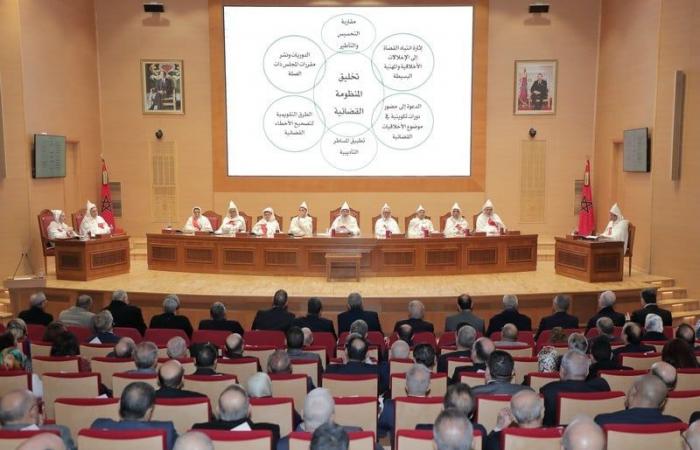Muhammad Abdel Nabawi, President-Delegate of the Supreme Council of the Judicial Authority, delivered a speech in which he reviewed the most prominent features of judicial performance in the Kingdom for the year 2024, while setting the priorities for the next stage.
During the official session, whose activities were attended by high-level judicial and diplomatic figures, a number of representatives of the executive and legislative authorities, and representatives of civil society organizations, Abdel Nabawi stressed that the event is an annual station for evaluating achievements and emphasizing readiness to face future challenges, and commitment to achieving timely justice and consecrating the rule of law.
The President-Delegate pointed out that “the judiciary derives its strength from the directives of King Mohammed VI, President of the Supreme Council of the Judicial Authority, who set a clear road map aimed at strengthening judicial governance, ensuring the independence of the judiciary, and supporting human rights in line with the requirements of the Constitution and the Kingdom’s international obligations.”
The same judicial official recorded that the judiciary achieved honorable results in 2024 despite the multiple challenges, explaining that “the courts were able to handle 4,466,727 cases out of 4,330,994 registered cases, achieving a completion rate of 103% of new cases,” noting that “ These achievements came thanks to the increased efforts of judges and employees in various courts in the Kingdom.”
“Despite the challenges witnessed in 2024, including social protests by some clerks and judicial professionals, the Kingdom’s courts were able to achieve tangible positive results,” the President-elect said, before adding that “the Kingdom’s courts registered 4,330,994 new files, and the judges decided on them.” In 4,466,727 cases, that is, a completion rate of 88.5% of the total number of popular cases, which is an unprecedented achievement.” He added: “It also decreased The judicial portfolio reached 577,851 cases, recording a noticeable decrease of 142,760 cases compared to the previous year, which reflects a noticeable improvement in performance.”
The same spokesman added, “Both courts of first instance and appeals have shown great progress in reducing the number of backlogged cases, as a decrease of 19.8% was recorded compared to the previous year, which reflects a noticeable improvement in handling cases and issuing rulings.”
Regarding the performance of the Court of Cassation, Abdel Nabawi spoke at length, noting that it “succeeded in issuing 52,904 decisions during the past year, which is equivalent to a completion rate of 109% of registered cases,” praising “the distinguished performance of the Real Estate Chamber and other chambers, as they presented qualitative judicial jurisprudence.” It contributed to unifying legal interpretation and enhancing judicial security.”
The same official confirmed that the Court of Cassation’s advisors had made significant progress in reducing the amount remaining by 9%, as it decreased from 51,247 files at the end of 2023 to 46,549 files at the end of 2024, before adding: “The court’s decisions were distinguished by courage and clarity, as they provided innovative solutions to extremely important social and economic issues.” “.
The same speaker highlighted that the Court of Cassation “contributed to unifying judicial jurisprudence by issuing targeted decisions on multiple topics, most notably protecting the social rights of families within government support programs, and promoting the principle of equality in the distribution of marital wealth based on written agreements, in addition to regulating the relationship between the lawyer and his client.” Within the framework of fees claims,” he pointed out that “the Administrative Chamber affected the issues of legal benefits and securing contracting rights, stressing the importance of balancing administrative responsibility and national solidarity.”
Abdel Nabawi went on to say that “the decisions of the Court of Cassation during 2024 reflected a tangible development in institutional performance and the independence of the judiciary, as it dealt with complex issues in a manner that balanced justice and fairness,” pointing out that “the rulings were characterized by comprehensiveness and accuracy, especially in cases of social rights and commercial transactions.” “and ensuring legal stability,” noting that “these developments contribute to enhancing citizens’ confidence in the judicial institution and raising the level of interaction between the judiciary and society, which supports the goals of achieving judicial security and development.” Sustainable.”
The President-elect drew attention to the fact that “the prominent decisions issued by the Court of Cassation last year were the decision of the Social Chamber regarding the right of female workers to compensation for arbitrary dismissal in the event of failure to respect fair conditions, in addition to the decision of the Civil Chamber, which considered that joint ownership obliges all parties to maintain The collective nature of the joint property.”
The same official noted that the Moroccan judiciary, through its advanced jurisprudence, has proven its role as a guarantor of rights and freedoms, stressing that “these jurisprudence constitute an important reference for lawyers, investors, and citizens, which enhances confidence in the Moroccan judicial system.”
To enhance the role of digitization, the President-Delegate called for strengthening cooperation between the various components of the judicial authority and continuing to adopt digitization to accelerate the pace of judicial work. He also stressed the importance of training judges and developing their skills, highlighting that “investing in the human element is an essential foundation for raising the quality of justice and ensuring keeping pace with the transformations the world is witnessing.” “.
Abdel Nabawi concluded his speech by emphasizing that “the new judicial year will be an opportunity to deepen the ongoing reforms in the judicial field, especially at the level of developing the family code and aligning national legislation with the international agreements ratified by the Kingdom.”






